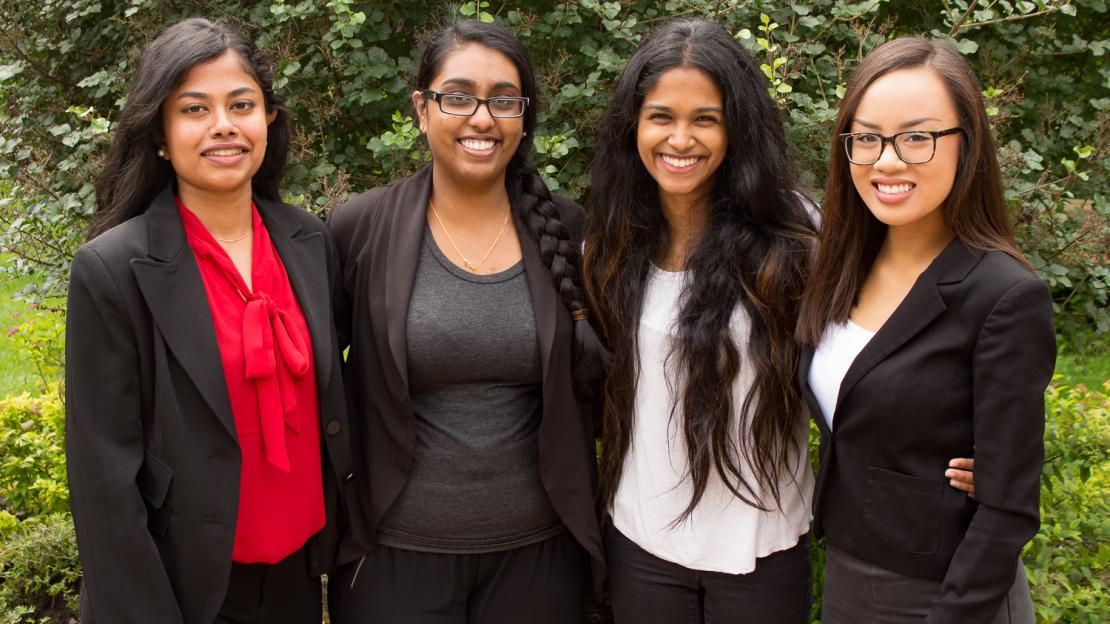A new club that brings awareness of neuroscience studies to local high school students is the brainchild of U of T Scarborough alumna Ramanja Pakirathan.
“We felt that we didn’t learn much about psychology and neuroscience until we began classes at university,” says Pakirathan, founder and program director of Brain Hackers UTSC. “If we had more information we could have considered directly applying to these programs.”
While Ramanja founded the club at UTSC, it was a group effort that involved connections between various staff, faculty and current students. George Cree, Associate Professor and Chair of the Department of Psychology and Hanan Domloge, psychology program manager, approached Pakirathan with the idea of creating a group similar to the Brain Hackers Association – a worldwide initiative founded in the U.S. to give students educational opportunities in brain and behaviour science.
Pakirathan saw the idea as a way to give back to the UTSC community that she says gave her so much.
“I’ve been part of many clubs and had a lot of mentors on campus,” she says. "Giving back in this way – it’s like a stepping stone for potential students that want to get into this program.”
Pakirathan elevated the group to an officially recognized club soon after graduating. The club gives students the opportunity to teach what they learn in university to high school students.
Pakirathan and Domloge worked together, first to discover what neuroscience topics high school students were interested in, and then to assemble an executive team. Today that team includes Pakirathan, Julia Santiago, Viethushaa Mohandas and Thaneya Kuganesan.
Brain Hackers UTSC then focused on getting the word out about their one-month after-school program for students to explore neuroscience topics with brief lectures and engaging activities. The program launched in May 2017 at two Toronto high schools, Sir Wilfrid Laurier Collegiate Institute and George Harvey Collegiate Institute.
“We start with the human brain and its structure,” says Pakirathan of the lecture schedule, which ends with ‘In the Field,’ sessions that present careers options in neuroscience and psychology.
“We adapted the Brain Hackers Association content to fit our community and what students are interested in,” says Pakirathan.
One of those adaptions included integrating questions about the popular Disney movie, Beauty and the Beast into sessions focused on personality. ‘Is Gaston, (the story’s antagonist) narcissistic?’ one of the questions asked.
Amanda Drover-Soriano, a teacher at George Harvey CI, says her Grade 10 career students enjoyed the unique learning experience.
“Students really connected with the hands-on nature of discovering the functions of the brain and were able to see how understanding themselves better, and how their brains work, benefits them in all areas of life,” she says.
Students like the George Harvey CI class have some time to think about post-secondary options, but Domloge says, especially with so many programs of study, early information is not wasted.
“The earlier high school students start thinking about undergraduate pathways the better,” she says. “It’s better to be made aware of options now.”
After a successful program launch, the executive team looks forward to the club’s next steps.
“We’re hoping to expand more into our local community and facilitate visits to the campus where students can meet some professors,” says Santiago, the club’s director of communications.
As much as Brain Hackers UTSC is about leadership and brain science awareness, the creation of the club demonstrates what can be done when departments and students work together.
“As a department, we are always looking for ways to engage our students and provide them with more meaningful learning opportunities,” says Domloge. “We hope Brain Hackers UTSC will pave the way for future students and alumni to build connections with our department. We are here to support students who are motivated to give back and get involved.”
